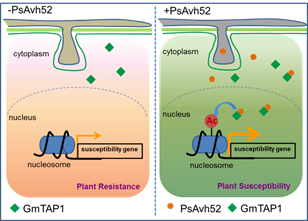On October 23, the internationally renowned academic journal eLife published another important innovation research result of the crop disease research team of Nanjing Agricultural University, entitled "A Phytophthora effector recruits a host cytoplasmic transacetylase into nuclear speckles to enhance plant susceptibility". Https://elifesciences.org/articles/40039), the first author of the thesis is Li Haiyang, a Ph.D. student, and the author of the communication is Professor Wang Yuanchao.
Histone acetylation modification is an important way to participate in the regulation of gene expression during biological growth and development. The research team previously found that the effector Avh23 expressed in the mid-to-late stage of the infection of Phytophthora sojae can inhibit the formation of histone acetylase complex, interfere with the acetylation of histones, and inhibit the expression of disease resistance genes (Current Biology, 2017). ). In this study, it was found that Avh52, an early-secreting effector molecule of Phytophthora sojae infection, can "hold" the soybean histone acetyltransferase protein GmTAP1, allowing GmTAP1 to enter the nucleus from the cytoplasm, and acetylated the plant susceptibility gene promoter region histone H2A. And the activation site on H3 activates the expression of host susceptible genes and promotes successful infection of pathogenic bacteria. The above studies indicate that pathogens can utilize different effectors at different stages of infecting the host, and interfere with the plant immune response by precisely regulating the level of epigenetic modification.

Mode of action of Phytophthora sojae effector Avh52
In the interaction between plants and pathogens, more than 300 disease resistance genes have been identified and used in agricultural production. However, research on the mechanism of plant susceptibility has rarely been reported. The susceptible gene maintains the affinity interaction between the plant and the pathogen. The development of gene editing technology provides an important tool for editing plant susceptible genes and improving the long-lasting broad-spectrum disease resistance of plants. However, the lack of understanding of susceptible genes limits the application of this technology. The crop disease research team of Nanjing Agricultural University has long used the key weapon of Phytophthora disease-effector as a cell probe to find the susceptible genes of plants. It has been found that Phytophthora can attack the host plant in the process of infecting host plants: endoplasmic reticulum stress signal-mediated plant disease response salicylic acid signaling pathway (Nature Communications, 2014), (Nature Communicaitons, 2016) , small RNA signaling pathway (Nature Genetics, 2013), acetylation of histones (Current Biology, 2017), variable cleavage of mRNA (Nature Communicaitons, 2017) and ethylene signaling pathway (New Phytologist, 2018). These findings not only provide new knowledge for understanding the immune mechanisms of plants, but also provide important new molecular targets for improving the long-term disease resistance of plants. (https://www.researchgate.net/profile/Yuanchao_Wang2)